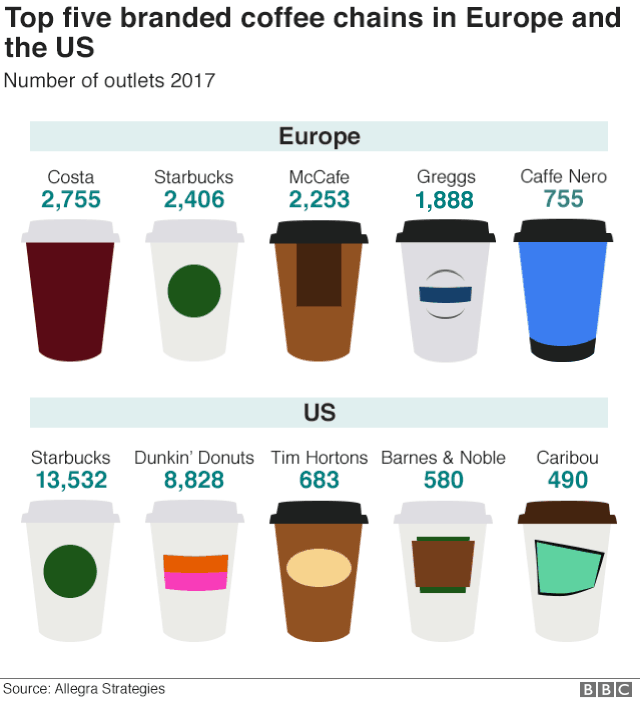Coca-Cola and Costa – a Costly Caffeine Conundrum
 Coke becoming… Coffee? Yep, you’ve read it right. Coca-Cola, the global mega-brand, has diversified its portfolio yet again by buying Costa Coffee, one of the major coffee house chains. Owner Whitbread got almost USD 4 billion out of the deal, while Coke got 4,000 cafes and a foothold in the market worth USD 165 billion. But… why would you buy coffee, when you have the original Coke?
Coke becoming… Coffee? Yep, you’ve read it right. Coca-Cola, the global mega-brand, has diversified its portfolio yet again by buying Costa Coffee, one of the major coffee house chains. Owner Whitbread got almost USD 4 billion out of the deal, while Coke got 4,000 cafes and a foothold in the market worth USD 165 billion. But… why would you buy coffee, when you have the original Coke?

Late last month, the news of the takeover shook Wall Street and coffee aficionados alike. From now on, the red-and-white logo that brought modern take on Santa Claus into the world will also shape the future of a new, unexpected market. „This is a coffee strategy, not a retail strategy,” says UK-born CEO of Coca-Cola, James Quincey. But if that is not the case, then what are the reasons for picking this rather unusual market to corner?
Keep in mind that coffee is not just some niche market. In 2007, UK was home to mere 10,000 coffee outlets. Fast forward 11 years and the number is above 24,000. Forecasts show this figure rising to 31,000 by 2022. People all over the world are drinking more and more coffee, and pick a coffee store or cafe as often as they go to work – or back home.

If you dig a little deeper, you can see that a move towards new markets by beverage peddlers is not a new thing. A while back PepsiCo, another fizzy beverage giant, has acquired SodaStream (makers of other types of sodas) while Nestle licensed Starbucks brand to get the piece of this most lucrative pie. The latter deal was for a cool USD 7.3 billion – a sum that seemed astronomical at the time.
It looks like the driving factor behind Coke going for coffee, instead of another soft drink, is the relative stagnation of the market along with the growing health concerns that make selling sugary sodas a risky business. Last month, the UK government announced a plan to ban selling energy drinks that would in effect axe one of Coke’s own products – the liquid booster called Relentless. The so-called ‘sugar tax’ has been making the rounds in the US and globally for a while now.

Growing at 6% annually, the flavourful bean sells really well and isn’t showing any signs of slowing down, despite ongoing debate over its own possible health hazards. After the takeover is complete, the Coke-making giant will not only have another, less unhealthy revenue stream in 32 countries, but will have an entirely new product line for its vending machines. Coupled with the addition of a solid infrastructure of 8,000 machines already selling coffee under the Costa brand, the sky is truly the limit.
Costa itself has already changed hands before, in 1995. Originally, the chain was owned by brothers Sergio and Bruno Costa – the family behind the name. Back at the time it was only 39 stores, and the price tag was a measly (in comparison) GBP 19 million. The other thing that is different this time is the investors’ optimistic reaction to the deal. In the wake of these news, Whitbread shares rose a sharp 16% at the market close.

“The deal is an attempt to adapt quickly to changing tastes, notably the continuing rise in popularity of coffee, particularly among millennial consumers,” says Angus Grierson of a well-known UK consultancy, LGB Corporate Finance. He too thinks that the move has a lot to do with the dwindling growth opportunities of the sweet and sparkling drinks. “Customers are choosing lower-sugar varieties of soft drinks more than they ever have, with sales of sugary drinks declining rapidly, down 11% in 2018,” he said, attributing the drop to the newly introduced sugar tax in the UK.
There is, however, yet another benefit to the deal that is not immediately obvious. Whitbread has been investing quite heavily into its stores in China, planning to increase its presence in the Land of the Dragon almost 300% – from 449 shops at the beginning of this year to almost 1,200 by 2022. The move is a strategic one, though, and not an obvious direction to go. Whereas in the US people drink on average 300 cups of Joe per year, per person, a typical citizen of China only consumes half a cup over the same period. Clearly, tea and other beverages have a long and storied past in this ancient culture, but perhaps with the advent of Coca-Cola-backed Costa things may soon change.

Coke isn’t the only one benefitting massively from the deal, that’s for sure. Unlike in many takeover stories, Costa is actually poised to become more than it is now. Forbes predicts that new types of offerings brought to life owing to Coca-Cola’s existing expertise may make Costa much more of a household name – quite literally putting it back on the dining table. There are already plans to launch sales of coffee beans – ground and fresh – to customers, options for takeaway and at-home products, as well as bottled or canned coffee. Remember that this is the company that basically invented the concept of bottling drinks and created a whole culture – and design philosophy – that not only boosted its brand’s awareness, but created a gargantuan revenue stream in the process.
Considering the company’s recent plastic waste reduction drive, the future looks rather interesting for the great Coca-Cola. Perhaps we will all benefit in one way or another. Until that happens, however, you can find me at a nearest coffee store, sipping a good old-fashioned Pumpkin Spice Latte (hold the lactose).
VOCABULARY
to diversify – zdywersyfikować
coffee house – kawiarnia
chain – sieć (sklepów, kawiarni itp.)
foothold – przyczółek, punkt zaczepienia (gdzieś)
takeover – przejęcie
aficionado – wielbiciel
modern take on X – współczesna odsłona/wersja X
unexpected – nieoczekiwany
retail – handel detaliczny, sprzedaż
CEO (Chief Executive Officer) – dyrektor naczelny
to corner a market – zmonopolizować rynek, podbić rynek
to keep sth in mind – mieć coś na względzie, pamiętać o czymś
niche – nisza, niszowy
mere – tylko, ledwie
outlet – placówka, sklep
forecast – prognoza
to dig a little deeper – zbadać coś dogłębniej
beverage – napój
peddler – sprzedawca (pot.)
fizzy – gazowany (pot.)
soda – napój gazowany
to get the piece of the pie – zarobić na jakimś trendzie/interesie, uszczknąć kawałek dla siebie
latter – ten drugi/ostatni
a cool X – okrągła sumka, okrągły X
driving factor – czynnik pobudzający/motywujący
soft drink – napój bezalkoholowy
stagnation – stagnacja, zastój
growing concerns – rosnące obawy
sugary – słodki, słodzony cukrem
to ban sth – zakazać coś
in effect – w praktyce
to axe sth – obciąć coś, zlikwidować
booster – coś, co energetyzuje, dodaje energii
so-called – tak zwany
to make the rounds – pokutować, przewijać się (gdzieś, często itp.)
annually – rocznie
flavourful – tu: aromatyczny, o intensywnym smaku/aromacie (UK)
not to show any signs of slowing down – nie wyglądać, jakby się miało zwolnić/przestać coś robić
ongoing – trwający
hazards – zagrożenia, niebezpieczeństwa
revenue stream – źródło dochodu
entirely – całkowicie, zupełnie
vending machine – automat do sprzedaży (kawy, słodyczy itp.)
coupled with X – w połączeniu z X, wraz z X
solid – solidny, pokaźny
the sky is the limit – nie ma granic, możliwości są nieograniczone
to change hands – zmienić właściciela
price tag – etykietka z ceną, cena
measly – mizerny, tyci
in comparison – w porównaniu
in the wake of sth – w wyniku czegoś, po czymś
at the market close – po zamknięciu sesji rynkowej
notably – mianowicie
well-known – doskonale znany (tylko przed rzeczownikiem)
to have a lot to do with sth – mieć wiele wspólnego/duży związek z czymś
sparkling – tu: gazowany
variety – odmiana
to decline – opadać, zmniejszać się
to attribute sth to sth – przypisywać coś czemuś
whereas – podczas gdy…
cup of Joe – kawa, kubek kawy (pot.)
storied past – szlachetna przeszłość, pełna chwalebnych dokonań historia
ancient – starożytny
advent – nadejście
massively – ogromnie
to benefit from sth – skorzystać na czymś
poised to do sth – w najlepszej pozycji do zrobienia czegoś
to predict – przewidywać
to bring sth to life – stworzyć coś
owing to sth – z powodu czegoś, dzięki czemuś
expertise – biegłość, fachowość
household name – doskonale znana marka
dining table – stół obiadowy
ground – mielony (np. ziarna kawy)
takeaway – na wynos (pot.)
canned – puszkowany
concept – idea, pomysł
to boost sth – wzmocnić coś, podbić
brand awareness – świadomość/znajomość marki
gargantuan – gigantyczny
waste – odpady
drive – kampania
to sip sth – popijać coś, sączyć
good old-fashioned X – stary, dobry X
spice – przyprawa
by Prochor Aniszczuk







